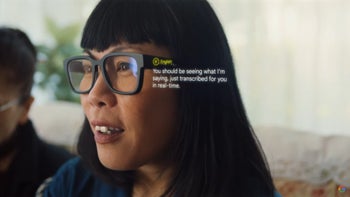Google's future AR glasses promise to break language barriers

Among many other new products like the Pixel 6a, Pixel Buds Pro and Pixel Watch, as well as early-look prototypes such as the Pixel 7 and Pixel Tablet, Google today also showcased a quick teaser of new augmented reality glasses. These AR glasses appear to be an extremely early prototype with an unknown release date, but the main goal of today's teaser seemed to first and foremost be to get us excited about AR, and it just might succeed.
Many of you will remember Google's previous attempt at augmented reality glasses – Google Glass. Back in 2013, the tech wasn't quite ready, the use cases weren't there, and the $1500 price tag was quick to discourage many a tech enthusiast. Funny how that works, right? Nowadays, $1500 wouldn't seem so unthinkable for a pair of cutting-edge, next-gen AR glasses.
You'll probably also remember Apple CEO Tim Cook's multiple statements about the bright future of AR – a technology that many consider to be a prime candidate for the next big frontier in the consumer tech world. So far, though, tech companies have failed to prove exactly why consumers should be excited about a future dominated by augmented reality glasses.

Today, Google CEO Sundar Pichai tried to change this perception with the early teaser of what could potentially become the successor to Google Glass.
There was just one use case suggested today, and it had to do with the AR glasses utilizing Google's accumulating expertise in live translation and transcription to enable a more seamless interlingual experience, where people speaking different languages can carry out a conversation in a considerably more natural manner than, say, by using a translator app on the phone.
You can see how it's supposed to work in the demo video. It's easy to get excited about such natural-looking glasses infused with super-powers of this caliber. Add a camera, and you can see how easy it'll be for these glasses to also show you automatically translated overlays on top anything you're looking at that's in an unfamiliar language.
Sure, you can kind of do this on your phone already, but the whole point Google's AR bet here is that if having something so powerful on the phone is great, it'll be 10 times more amazing when you can just see it as part of the real world. It's a positive outlook, no doubt. Just like seeing Google once again holding a live conference open for actual attendance. Pichai is right: the real world is pretty amazing.
Let's hope it'll stay that way through the lens of AR glasses.










Things that are NOT allowed: